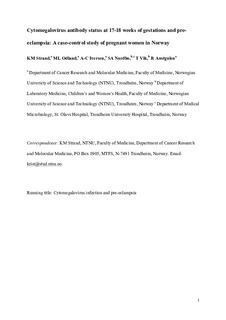| dc.contributor.author | Strand, Kristin Melheim | |
| dc.contributor.author | Odland, Maria Lisa | |
| dc.contributor.author | Iversen, Ann-Charlotte | |
| dc.contributor.author | Nordbø, Svein Arne | |
| dc.contributor.author | Vik, Torstein | |
| dc.contributor.author | Austgulen, Rigmor | |
| dc.date.accessioned | 2017-10-09T07:12:05Z | |
| dc.date.available | 2017-10-09T07:12:05Z | |
| dc.date.created | 2012-10-03T08:13:06Z | |
| dc.date.issued | 2012 | |
| dc.identifier.citation | BJOG: an International Journal of Obstetrics and Gynaecology. 2012, 119 (11), 1316-1323. | nb_NO |
| dc.identifier.issn | 1470-0328 | |
| dc.identifier.uri | http://hdl.handle.net/11250/2459070 | |
| dc.description.abstract | Objective
To assess the association between maternal cytomegalovirus (CMV) antibodies in mid-pregnancy and preeclampsia.
Design
Nested case–control study. Setting Pregnancies registered in the Norwegian Mother and Child Cohort Study (MoBa): a large population-based pregnancy cohort (1999–2006).
Sample
A cohort of 1500 women with pre-eclampsia and 1000 healthy pregnant women.
Methods
Plasma samples and pregnancy-related information were provided by the MoBa. Antibody status (CMV IgG and CMV IgM) and levels (CMV IgG) at 17–18 weeks of gestation were determined by enzyme-linked immunosorbent assay (ELISA).
Main outcome measure
A diagnosis of pre-eclampsia, as defined in the Medical Birth Registry of Norway.
Results
There was no evidence of an effect of CMV IgG seropositivity on the likelihood of developing pre-eclampsia, and CMV IgG antibody levels among women who were seropositive did not differ between groups. Adjusted for maternal age, parity and smoking, the odds ratio for pre-eclampsia in women seropositive for CMV IgG was 0.89 (95% CI 0.74–1.05; P = 0.17). The proportions of women who were seropositive for IgM did not differ between women with pre-eclampsia and women who were healthy (P = 0.98). Among nulliparous women, the proportion of women who were seropositive for CMV IgG was slightly lower among women with pre-eclampsia (53.5%) than among healthy women (59.8%) (P = 0.03). Subgroup analyses were performed for women with early or late onset pre-eclampsia, with preterm delivery and/or with neonates that were small for gestational age, but antibody status did not differ between pre-eclampsia subtypes and controls.
Conclusions
The presence of maternal antibodies to CMV was not associated with pre-eclampsia in our study. The results suggest that CMV infection is unlikely to be a major cause of preeclampsia. | nb_NO |
| dc.language.iso | eng | nb_NO |
| dc.publisher | Wiley | nb_NO |
| dc.title | Cytomegalovirus antibody status at 17 - 18 weeks of gestation and preeclampsia: a case-control study of pregnant women in Norway | nb_NO |
| dc.type | Journal article | nb_NO |
| dc.type | Peer reviewed | nb_NO |
| dc.description.version | acceptedVersion | nb_NO |
| dc.source.pagenumber | 1316-1323 | nb_NO |
| dc.source.volume | 119 | nb_NO |
| dc.source.journal | BJOG: an International Journal of Obstetrics and Gynaecology | nb_NO |
| dc.source.issue | 11 | nb_NO |
| dc.identifier.doi | 10.1111/j.1471-0528.2012.03420.x | |
| dc.identifier.cristin | 948308 | |
| dc.relation.project | Norges forskningsråd: 183234 | nb_NO |
| dc.description.localcode | This is the peer reviewed version of the following article: Cytomegalovirus antibody status at 17 - 18 weeks of gestation and preeclampsia: a case-control study of pregnant women in Norway, which has been published in final form at http://onlinelibrary.wiley.com/doi/10.1111/j.1471-0528.2012.03420.x/epdf. This article may be used for non-commercial purposes in accordance with Wiley Terms and Conditions for Self-Archiving. | nb_NO |
| cristin.unitcode | 194,65,10,0 | |
| cristin.unitcode | 194,65,15,0 | |
| cristin.unitname | Institutt for laboratoriemedisin, barne- og kvinnesykdommer | |
| cristin.unitname | Institutt for kreftforskning og molekylær medisin | |
| cristin.ispublished | true | |
| cristin.fulltext | original | |
| cristin.qualitycode | 2 | |
